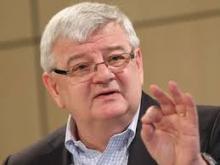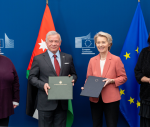You are here
Darkness over Kabul
Apr 24,2021 - Last updated at Apr 24,2021
BERLIN — The Afghan drama is nearing its end, at least as far as Western militaries are concerned. Exactly two decades after Al Qaeda’s attack on the World Trade Centre in New York City, the last Western troops are, if US President Joe Biden sticks to his timetable, scheduled to leave Afghanistan on September 11, 2021. The war had to end at some point. But after so much blood and treasure spent, many will be wondering what, if anything, has been achieved.
Though Al Qaeda’s terror network was weakened by the war, it was not destroyed. The United States tracked down and killed the group’s leader, Osama Bin Laden, and expelled the Taliban from Kabul. But outside of the capital and a few other areas, the Taliban is stronger than ever — and poised to reclaim power once Western troops leave.
Radical Islamist terrorism has not been defeated, either militarily or ideologically and remains a constant threat to the West. After all these years, Afghanistan still lacks stable governing structures capable of policing domestic terrorism, corruption, and the drug trade, let alone offering Afghan society the prospect of a more peaceful, prosperous future. Regional stability will probably be more fragile after the Western withdrawal than it is today.
We should harbour no illusions. The West’s troop drawdown amounts to a defeat, the humanitarian consequences of which will be dramatic. For the Afghan people, the war will continue. The probable return of the Taliban and their stone-age Islamism will again force women and girls under the burqa and deprive them of their human rights. Legions of well-educated, urban Afghans will try to flee to the West. Those who remain will face a dismal fate, along with most ethnic and religious minorities.
One wonders if the European Union and NATO are really prepared for what comes next. Militarily, the withdrawal makes sense: The West has nothing to gain in Afghanistan. Yet, in humanitarian and moral terms, it is flirting with a foreseeable disaster. The EU, in particular, should expect a large flood of refugees, reminiscent of the Vietnamese “boat people” who sought shelter in the West after the US withdrawal from Vietnam.
The geopolitical price will also be high. How will Islamist extremist groups interpret the West’s acceptance of defeat? Will Afghanistan really not become a terrorist safe haven again, as it did after the end of the Cold War and the withdrawal of the erstwhile Red Army? And, beyond Central Asia, might not Russia and China respond to the West’s perceived weakness with increased aggression toward Ukraine and Taiwan, respectively?
Biden’s inaugural message was that “America is back”. But the loss of US credibility after Donald Trump’s presidency cannot be reversed so easily. The process of restoring America’s place in the world will take time and could lead to dangerous miscalculations by its foes and rivals.
In Afghanistan, the end of the West’s long presence will create a power vacuum that competing regional powers will seek to fill. The last 20 years were not just about America and its war against Al Qaeda and the Taliban. For Pakistan, the war has always been about safeguarding its hinterland against its archenemy, India. Islamist terrorism is a key tool in Pakistan’s effort, which is why its policy toward the US has been so ambiguous. On one hand, Pakistan allowed the US to use its harbours and territory to provision US forces in Afghanistan. On the other hand, it provided a safe haven for Islamist terrorists, including bin Laden and much of the Taliban leadership.
Meanwhile, the Iranian regime has long sought to protect the Afghan Shiite population and its own eastern border by maintaining a presence in western Afghanistan. And the region’s largest, most expansive power, China, has significant natural-resource and geopolitical interests in the country. In addition to being a potential entrepôt for China’s Belt and Road Initiative, Afghanistan’s close relationship to Pakistan could become more salient now that China has rekindled its Himalayan border conflict with India.
Just as the West’s presence in Afghanistan has helped to contain these conflicts, so will its withdrawal likely have the opposite effect. China will increasingly try to assert itself as America’s successor as regional hegemon. Whether it can handle this powder keg better than the Soviets and the Americans did is another matter. There are good reasons to doubt that it can.
The tragedy of Afghanistan, at least since the nineteenth century, is that it has constantly been the focus of great-power interests. Early on, it was a major bone of contention between the British and Russian Empires in their scramble for Central and South Asia. Then in the twentieth century, it got caught in the crossfire of the Cold War, when the Soviets invaded in 1979.
After the Soviets withdrew in 1989, the country descended into civil war, becoming a base for groups like Al Qaeda when the Taliban consolidated control. And, after September 11, 2001, the US and its Western allies swooped in. All told, the country has been at war for a half-century, and there is no reason to think that its misery will end anytime soon.
There is no stable alternative to a Western military presence in Afghanistan. September 12, 2021 will not bring a safer, better world. On the contrary, the Western withdrawal inevitably will result in humanitarian catastrophe. The Afghan people will be the first to suffer, but they will almost certainly not be the last.
Joschka Fischer, Germany’s foreign minister and vice chancellor from 1998 to 2005, was a leader of the German Green Party for almost 20 years. www.project-syndicate.org













